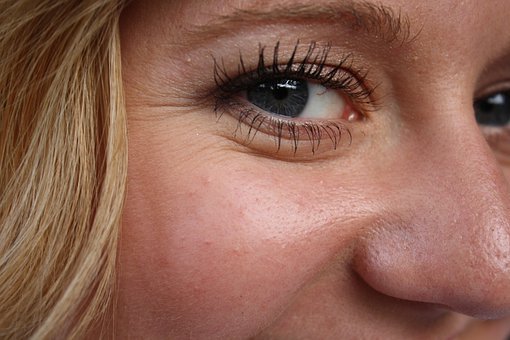If you consider your eyes to be a window into your soul, you’ll want to take good care of the skin around them. The area around your eyes is very thin and sensitive.
The skin around your eyes is more prone to dryness, droopiness, lines, and wrinkles than the skin on the rest of your body because it has fewer oil glands and collagen. The areas of skin with fewer oil glands are more likely to get wrinkles, which is why crow’s feet is such a problem.
What are some of the most common concerns that dermatologists hear about regarding the area around the eyes? And what are their suggestions for addressing these concerns?
Common Eye Concerns
Dark Circles
Even though they are connected to not getting enough sleep, sometimes sleeping for eight hours a night will not make them go away. This is because dark circles have a genetic component. Creams that contain caffeine or vitamin K can help with improving circulation and make circles lighter.
If you’re constantly waking up with puffy eyes, it may be due to fluid retention overnight. Keeping a jade roller in your fridge to help with this. Using jade rollers on the eye area when they’re cold to help reduce puffiness. Pick an eye roller that’s small and spherical in shape to use on the delicate under eye area. Roll the under eye bags in the morning. Cold temperatures lead to reduced blood flow in order to reduce eye-area swelling.
Fine Lines and Wrinkles
Choose an eye cream that contains either retinol or peptides. Retinol and retinoids, which are derivatives of vitamin A, help to stimulate skin cell turnover and collagen production. Retinol can improve the overall texture of your skin and reduce the appearance of wrinkles and fine lines. For best results, apply retinol every night for four to eight weeks.
In the morning, use an eye cream with green tea in it. Green tea is an ingredient that has a lot of antioxidants in it and it protects skin against the environmental stressors that can cause aging.
Green tea polyphenols, which are antioxidant compounds, can neutralize aging free radicals in the body, lessen the risk of sunburn, and decrease the activity of an enzyme that degrades collagen in your skin, according to a review published in February 2019 in the journal Nutrients.
Use sunscreen regularly. The result of using sunscreens is that there is less UV damage, and fewer lines and wrinkles.
Redness and Irritation
If you have an intolerance or sensitivity to an ingredient commonly found in beauty products, such as fragrance, preservatives, or natural plant extracts, it is likely that your eyes will be the first area of your body to show signs of irritation, or the irritation could be more severe in this area.
Redness and irritation can be caused by an allergen, this can be from the environment for example pollen or from a cosmetic product you are using on your face.
If you notice any redness or irritation you may need to do some investigation to determine which ingredient is the culprit.
Super Amino 23 is featured in the Physician’s Desk Reference for rapidly absorbing protein into the bloodstream in 23 minutes. Leaving no toxic residue, it helps improve mental acuity, tighten skin, and build collagen to provide lean and healthy muscle.
Care For Your Eyes
1. Do commit to treating your eye skin
It is important to give the thin skin around your eye the moisture it needs. To adequately hydrate the area around your eyes, you need a moisturizer that can penetrate the skin.
2. Don’t rely on your regular facial moisturizer to get the job done
You need an eye cream that is specifically designed for eyelid skin.
The active ingredients in face serums and moisturizers may be too strong of a concentration for the skin under your eyes.
3. Do opt for actives when choosing an eye cream
An eye cream with retinol is one of the best options for a moisturizer.
An eye cream that contains retinol is specifically formulated with a lower concentration of retinol and in a more emollient base to reduce the risk of irritation. The cream is also designed to boost hydration by including ingredients like hyaluronic acid.
4. Keep your skin clean
You should clean the skin around your eyes at least once per day using a gentle cleanser. Removing your makeup before bedtime will help to remove toxins, impurities, and free radicals, and will keep your skin looking healthy and vibrant.
5. Protect your eyes from the sun and environmental toxins
As more and more evidence comes out linking environmental factors like pollution and exposure to sunlight to skin aging, some companies are developing new sunscreen formulations that can protect against damage from both UV exposure and free radicals.
You should use a mineral sunscreen formula on the delicate and sensitive eye area. There are two types of mineral sunscreens: those made with zinc or titanium dioxide. Stick sunscreens are less likely to drip and are therefore a good choice for people who are likely to sweat or be active outside. There are also sunscreen products available that are specifically designed to protect the area around the eyes.
You can reduce exposure to ultraviolet rays by wearing sunglasses and hats.
6. Moisturize and drink water
Using a product that contains hyaluronic acid around the eyes can help to plump the skin and diminish the appearance of fine lines and wrinkles. If your skin is youthful, you might only require a light moisturizer. As you age, however, it’s important to use a richer, thicker moisturizer.
Drink eight to 10 glasses of water each day to ensure your skin gets the hydration it needs.
7. Try natural remedies
Tried-and-true home remedies can promote healthy skin and diminish under-eye bags. These are a few we’ve found to be effective:
- Hold a cool compress on your eyes while sitting upright.
- Get 7 to 9 hours of quality sleep each night so your skin can rejuvenate.
- Prop up your head to prevent fluid from settling around your eyes.
- Prevent or treat known allergies that cause under-eye bags.
- Quit smoking to protect the already thin and delicate under-eye skin.
- Limit dietary salt to prevent fluid retention under the eyes and elsewhere.
- Drink tea or apply it to the skin — especially green tea, which has anti-skin-aging properties and caffeine thought to benefit the skin
- Apply Shea butter, coconut oil, palm kernel oil, palm oil, soy oil, baobab oil, or python oil, which can all help promote a healthy skin barrier
Natural remedies can be effective, but be careful of ones that are heavily advertised but have little scientific evidence to back up their claims. Some of these remedies can cause skin irritation or even eye infections.
8. Be careful with makeup
To effectively hide under-eye bags, you need to take care of the skin and address the root of the problem, rather than just covering the problematic area with makeup. If you want to conceal under-eye wrinkles and bags, makeup is a common choice. However, using makeup on dirty skin or with old products can make the problem worse.
While makeup doesn’t have an expiration date, it is recommended by dermatologists to throw away foundation, eyeliner, and concealer after one year, mascara after six months, and eyeshadow after two years. If you use makeup after it has expired, you are more likely to get styes and infections because of the bacteria that builds up from using it regularly.
Never share your eye makeup with anyone to avoid infection and always make sure the skin around your eyes is clean before applying any makeup. This will help avoid trapping impurities underneath it. Be sure to remove your makeup before going to sleep at night.
9. Invest in the right skin care ingredients
Retinoids, such as tretinoin or retinols, can help improve the appearance of your skin. Researchers have found that using retinoids around your eyes can help to improve skin firmness and elasticity.
Retinoids can irritate the skin and cause problems, especially around the eyes. People who use retinols should stay out of direct sunlight as much as possible. Thankfully, there are other options.
- Topical antioxidants such as vitamin C have also proven to be important ingredients in topical skin care. Among other benefits, vitamin C can improve collagen production.
- Hyaluronic acid, found in many dermal fillers, is another ingredient commonly found in skin care products. It helps to hydrate and plump lackluster skin.
- Topical estrogens may help revive estrogen-deficient skin, a symptom of menopause.
- Niacinamide is one of the most sought-after ingredients in skin care today. The vitamin B derivative can help strengthen and firm the skin’s barrier.
When you are researching and buying skin care products, remember that the FDA does not have the same level of control over them as it does over drugs and devices. So, be choosy and look at the ingredients list carefully.
10. Nonsurgical treatment options
Dermatologists often use dermal fillers to help rejuvenate skin around the eyes. Dermal fillers are hyaluronic acid injections which are used in order to treat sagging or hollow eye skin. Some fillers also help to stimulate collagen production, which then in turn helps to prevent wrinkles and encourage eye skin elasticity.
Some skin care professionals may suggest a treatment involving radiofrequency waves. Radiofrequency energy waves are used to tighten the skin under the eyes by heating the deeper layers. This encourages cell turnover and elastin production, which results in tighter, younger-looking skin.
Laser resurfacing and chemical peel treatments work by gently removing the top layer of skin to reveal new, more youthful skin. These treatments can also help to improve the skin’s tone and minimize the appearance of under-eye wrinkles and bags.
Most treatments that involve filling or using a device are noninvasive or minimally invasive, which means that you won’t have to take much time off (if any). However, complications can still happen, so it’s important to go to a provider who is experienced with eye treatments.
Diet and Lifestyle Changes that can help Remedy Eye Problems
Get adequate sleep.
According to the National Sleep Foundation, drinking too much alcohol can also lead to bags and dark circles, and it can affect the quality of your sleep. It is important to get seven to nine hours of sleep per night and to limit alcoholic beverages to one per day for women and two per day for men.
The research shows that when you are tired, your eyelids droop, your eyes swell up and you get dark circles. This makes you look tired and is not the message you want to give.
Stay hydrated.
You should drink half an ounce to one ounce of water per pound of body weight each day, according to the National Academies of Sciences, Engineering, and Medicine.
A study found that proper hydration is linked with both an increase in skin elasticity and fewer dark under-eye circles. A lack of water in your system can cause your under-eye area to appear darker because the skin is thinner in that area and the blood vessels beneath are more visible. Being properly hydrated can help increase your skin’s elasticity, which can in turn help reduce the appearance of dark under-eye circles.
For effective rehydration try Super Lytes a rehydration supplement made with natural ingredients that will rebalance sodium and electrolyte levels in your body.
Sources:
https://www.aao.org/eye-health/tips-prevention/bags-under-eyes
https://pubmed.ncbi.nlm.nih.gov/30813433/
https://pubmed.ncbi.nlm.nih.gov/33666618/
https://pubmed.ncbi.nlm.nih.gov/33928725/
https://pubmed.ncbi.nlm.nih.gov/33946734/
https://pubmed.ncbi.nlm.nih.gov/33242128/
https://www.allure.com/story/what-is-niacinamide-skin-care-benefits
https://www.sleepfoundation.org/nutrition/alcohol-and-sleep#:~:text=Moderate%20amounts%20of%20alcohol%20(two,decreased%20sleep%20quality%20by%2039.2%25.
READ MORE: Everyday Eye Health Care









